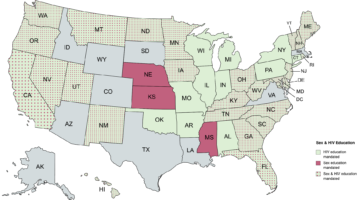Why Abstinence and “Purity” Pledges Don’t Work
May 20, 2016 by Justin Lehmiller
In the United States today, 37 states mandate that information on abstinence be provided in sex education courses. As you might imagine, it’s not uncommon for students to be asked to take “purity” or virginity pledges as part of the sex ed. curriculum in these states.
Students are encouraged to take these pledges in order to reduce the spread of sexually transmitted infections, but also to help prevent unwanted pregnancies. As it turns out, however, abstinence pledges don’t necessarily accomplish either of these goals. In fact, a recent study published in the Journal of Marriage and Family suggests that they might do just the opposite!
In this study, researchers utilized data from a nationally representative, longitudinal survey (Add Health). Data were collected at several intervals between 1994 and 2008. All participants were adolescents in grades 7-12 at the time the study began.
For this particular analysis, researchers focused on two subgroups. First, they looked at how taking a virginity pledge was associated with the likelihood of being diagnosed with HPV. This analysis focused specifically on sexually active women who provided urine samples in 2001-2002 that were tested for this virus. There were 3,254 women in this analysis, of whom 15% reported having taken a virginity pledge.
Second, they looked how taking a virginity pledge was associated with becoming pregnant outside of marriage among girls who were in grades 7 and 8 when the study began and who had not yet had intercourse at that time. There were 1,335 women in this analysis, of whom 23% reported having taken a virginity pledge.
The results revealed that, among women with two or more sex partners, those who had taken virginity pledges were more likely to have tested positive for HPV compared to those who hadn’t taken such pledges. The biggest difference was among women with 6-10 partners—in this group, 51% of pledge takers had contracted HPV versus 33% of women who hadn’t taken the pledge.
Furthermore, pledge takers were significantly more likely than non-pledge takers to become pregnant outside of marriage within six years of their first sexual intercourse—30% vs. 18%, respectively. In both groups, the vast majority of these pregnancies were unplanned (75-80%).
So what’s going on here? The authors of the research argued that “both sets of results are consistent with the notion that pledge breakers were less likely to be consistent users of condoms; as their exposure risk increased, they had increased risk of negative health outcomes.”
It seemed that those who took virginity pledges were less prepared when it came to practicing safe sex, perhaps because abstinence-only sex education courses have a tendency to downplay the effectiveness of condoms and contraceptives. However, it could also be that perhaps these folks were just less prepared to communicate about sex.
Whether something similar happens in men is unclear because they were not considered in this analysis. Also, it’s important to clarify that virginity pledges don’t necessarily increase risk of STIs and unintended pregnancies in everyone. Some folks, particularly those with a high degree of religious commitment, may be less likely to break pledges like this and, consequently, may have better sexual health outcomes.
With all of that said, it appears that abstinence pledges can have unintended consequences. Indeed, when these pledges are broken, research suggests that women’s risk of negative outcomes is higher than it would be if they had never taken such a pledge in the first place.
Want to learn more about Sex and Psychology ? Click here for previous articles or follow the blog on Facebook (facebook.com/psychologyofsex), Twitter (@JustinLehmiller), or Reddit (reddit.com/r/psychologyofsex) to receive updates.
To learn more about this research, see: Paik, A., Sanchagrin, K.J., & Heimer, K. (2016). Broken promises: Abstinence pledging and sexual and reproductive health. Journal of Marriage and Family, 78, 546-561.
Image Credit: 123R/lculig
You Might Also Like:

Dr. Justin Lehmiller
Founder & Owner of Sex and PsychologyDr. Justin Lehmiller is a social psychologist and Research Fellow at The Kinsey Institute. He runs the Sex and Psychology blog and podcast and is author of the popular book Tell Me What You Want. Dr. Lehmiller is an award-winning educator, and a prolific researcher who has published more than 50 academic works.
Read full bio >

